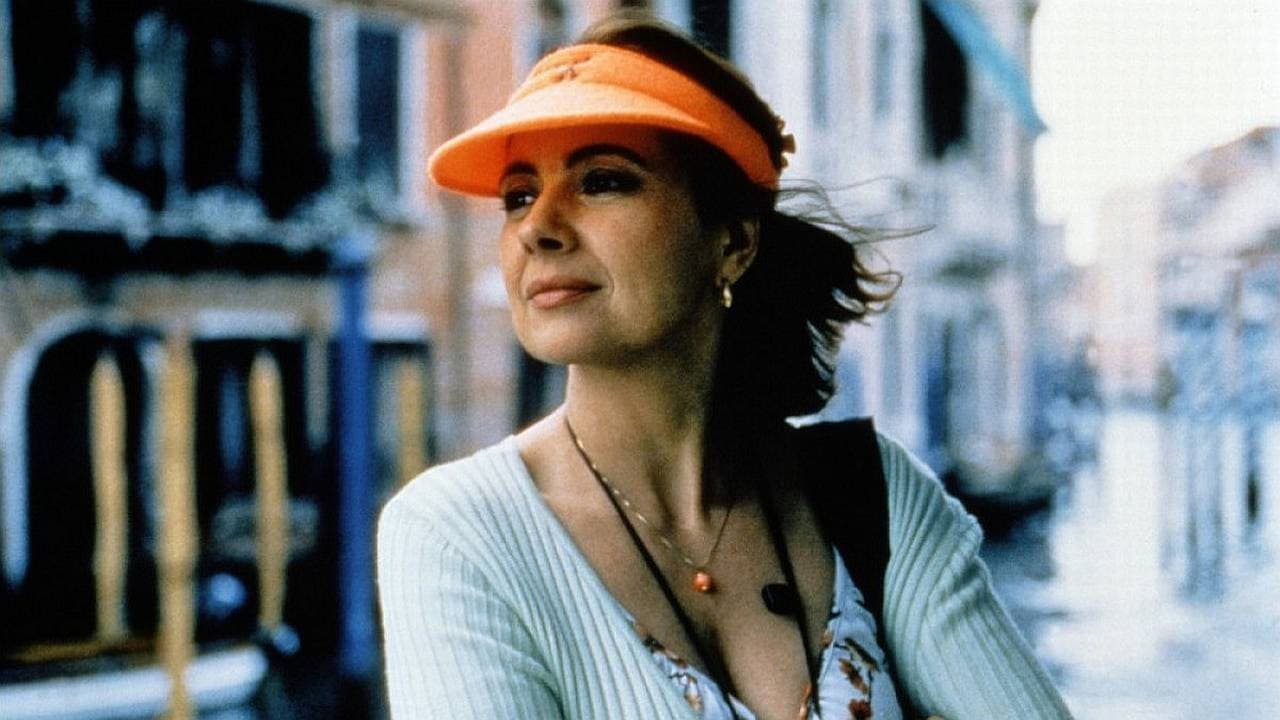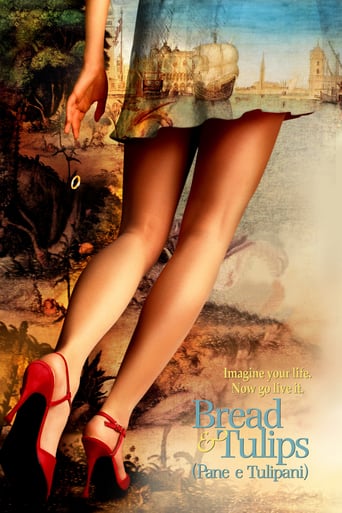Matialth
Good concept, poorly executed.
Konterr
Brilliant and touching
Guillelmina
The film's masterful storytelling did its job. The message was clear. No need to overdo.
Phillipa
Strong acting helps the film overcome an uncertain premise and create characters that hold our attention absolutely.
secondtake
Bread and Tulips (2000)A feel good movie that is also a good movie. It's beyond just warm and colorful, with scenes of Venice night and day, and beyond just triumphant, with true love winning in more ways than one. It is most of all populated with great characters. Italian leading lady Licia Maglietta is a wonder of naturalistic acting. She is sympathetic of course, but not a cliché. She plays a housewife on a diversion away from her family, and she looks and acts like a housewife. As strong as she is, and as independent, she is also devoted to her family. The fact she left them at all is perfectly unfolded as an accident that she turns into an opportunity, all by intuition. The man she meets is no paradigm of handsome or charming, in fact he's just the opposite. But he is so inherently good, a really decent human being, she comes to like him, and look out for him. Played by Swiss actor Bruno Ganz, he matches Maglietta's believable ease and imperfect, quiet intensity. The rest of the cast is truly supportive, and tips just slightly (or more than slightly in one case) into caricature, to reminds us, I suppose, that this is a movie, a fantasy, a comedy in many ways.But it's also a deeply serious and moving love story between two middle-aged people who are ready for renewal.I have a feeling many people, especially people with families or those conservative at heart, will find the basic premise of a woman leaving her family in a glib and almost carefree way and not going back for a long time to be shameful or even sinful. Her kids are normal distracted teenagers who like her when they notice her, her husband is a hardworking and loud businessman who doesn't beat her, her home is her own and comfortable. In other words, she has a really normal life, a good one by most measures. Does everyone have the right to up and leave a working family relationship because they feel a bit restless? Is this movie a worship of selfishness?Or is it a reminder that life is short and you have to get to what really matters, and be with people who are truly wonderful and good, no matter what?I can't think of a more joyous way to ask the question.
cdimedici
I will state up front that I knew nothing about this movie before I selected it. I selected it only to aid my efforts in studying Italian language and to avoid the all to familiar movie story line of good guy beats bad guy, gets beautiful woman on way to standing ovation happy ending. This movie, like most Italian movies I have seen doesn't have that.I was very pleasantly surprised with the movie and it has stuck in my mind for quite a while after having watched it. It is not "art like" like a Fellini movie, and i would say it is a notch below an Il Postini or Cinema Paradisimo.I think it does an accurate job portraying the modern day Italy. There are places in Italy that are absolutely beautiful and others that are not. Many movies only show the beautiful parts and I think that this could be done on purpose to show the good and bad parts of both Fernando and Rosalba's lives.The movie takes a lot of twists and turns that are not predictable; the noose, Fernando's family, the dream or reality scene at the end. These keep the movie flowing. While some have said the story isn't realistic, the character development is great. I felt like i knew both of the leads be the end of the story. There is the conflict of wanting Rosalba to find happiness with Fernando, job satisfaction in the flower shop in Venice vs her family obligation to her children, housewife boredom(and cheating husband).Overall I think this is a pretty good movie and is worth seeing. I would rank it in the top quarter of the 20 or so Italian movies (excluding those Rome movies-separate category) that I have seen. It can get funny at times, bordering on silly, unrealistic perhaps, but the leads are great and the movie keeps you guessing. Oh, and its great for supplementing my Italian study efforts.
Brian T. Whitlock (GOWBTW)
If you like some romantic flair Italian style, "Bread and Tulips" is just your bang! Self-discovery is what a lot of people want, even I would do such a thing. When you got a housewife who accidentally left behind on vacation, she begins to discover herself one step at a time. She got two sons, a husband who happens to be anything but faithful. Then there's this owner of a apartment with a troubled past, who gets the surprise he'll never forget. There was a lot of meaning to the movie. It has everything to do with flowers, especially the tulips. It's funny when the husband sent a detective to find the wife. Only to find love as well. So that's two people on a quest of discovering themselves. Living in Venice can be a great discovery for anyone: The music in the air, the people, the restaurants, the entertainment anything to top it off. This movie can make you either fall in love, or build up Aan appetite you never have in your lifetime. I would go to Venice and get the experience of the lifetime. Let your spirit soar in this movie. CIAO! 5 STARS!
Dennis Littrell
This is a wry, witty Italian comedy with a underlying radical message I don't think the Vatican would approve. Licia Malietta stars as Rosalba Barletta a woman not enamored with either her macho, inconsiderate husband Mimmo Barletta (Antonio Catania) or her life as a housewife. On a vacation she is accidentally left behind in Venice, and then on a whim decides to stay for awhile. She needs to breathe free from the domination of her husband who sees her only as an asset and doesn't love her. Indeed he has a mistress.What she finds in Venice are new warm friends and a certain man, Fernando Girasoli (played with sly finesse by veteran Swiss-born actor Bruno Ganz), who speaks in poetic phrases but wants to hang himself. She also rediscovers a delight in life and the freedom to be herself and do what she wants to do, which includes playing the accordion and reading Mark Twain in bed. She finds a job in a flower shop, a small room, makes friends with the masseuse next door and feels alive for the first time in ages.Her husband sends a plumber he is about to hire to play detective, find her and bring her back, resulting in some light comedic episodes enriched by off-beat characters.Malietta is very winning in the part and certainly will serve as a heroine for frustrated housewives everywhere. Her desire is not for a fling or for physical thrills, rather her desire is to find herself as herself apart from her identification as wife and mother.I have hinted above at her eventual choice, but you will have to see this warm-hearted romantic comedy for yourself to find out what she chooses and why.(Note: Over 500 of my movie reviews are now available in my book "Cut to the Chaise Lounge or I Can't Believe I Swallowed the Remote!" Get it at Amazon!)

